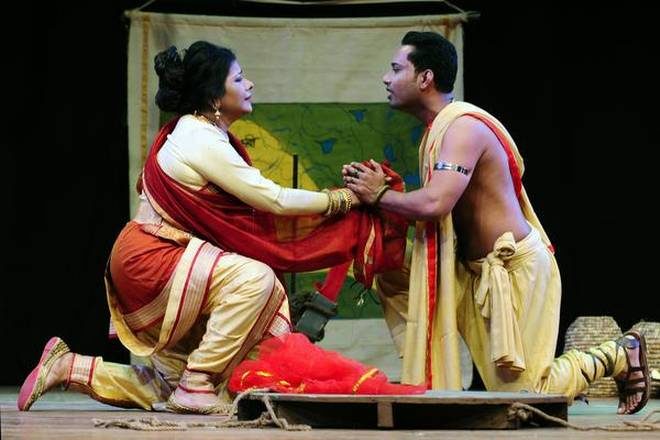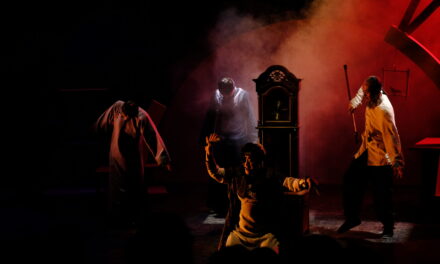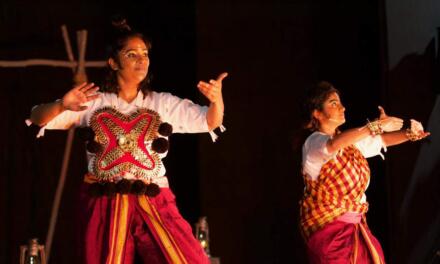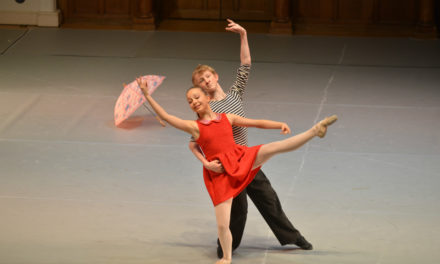Showing Kunti’s first born in a different light, young Bangladeshi director Jayita Mahahlanobish makes a mark among the Delhi theatre audience.
It was a matter of pride and pleasure for Bangladesh’s Jayita Mahahlanobish when her maiden play Prothom Partho was selected for the ongoing 19th Bharat Rang Mahotsav. Having acted in more than 20 plays besides feature films and television, Jayita was initially worried when Abdullah-Al-Mamum Theatre School, Bangladesh staged the play this week at Bharangam. The worry turned out to be unfounded as the audience received the play with warmth. Based on well-known playwright Buddhadeva Bose’s story, the central character of the play is Karna, who, born to Kunti (also called Pritha) is referred to as Prothom Partho, first child of Pritha.
Divided into three sections the story shows how Karna before the beginning of Kurukshetra war is met by Lord Krishna, Kunti and Draupadi in order to convince him to leave the Kauravas and join the Pandavas. Despite all arguments, pleadings, and threats, Karna refuses, opting to stand by his friend Duryodhana. For Jayita the story goes much beyond loyalty as it highlights how a society’s prejudice and ill-treatment turns a principled and intelligent person like Karna into a villain. “Nobody is born evil it is the people’s behaviour, narrow thinking and holier than thou attitude which makes even the best succumb to favours of those who are eager to exploit their talents for vested interest,” avers Jayita. She goes on to add, “Karna is not black or white but a mortal. That is why he touches the audience.”
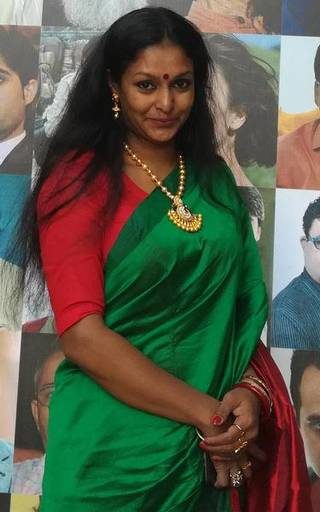
Bangladeshi director Jayita Mahahlanobish
Moving to Patna to perform at the Parallel Festival of BRM, Jayita spoke about her play, how theatre is faring in Bangladesh and her new project.
Excerpts:
What made you choose Prothom Partho as your debut directorial venture?
I find Karna’s very fascinating. Brave, good looking, ace archer and endowed with endearing qualities yet he suffers in Mahabharat for no fault of his. Karna is a mystery wrapped in an enigma as scholars are unable to fathom him. More than this I see a parallel between his case and that of youngsters becoming extremists. Sheer neglect, deprivation, and insult by society make people become hard to the extent that they become violent and take refuge in evil. This is precisely what happened when Karna became Duryodhana’s friend. This is precisely is the subtext of Buddhadeva Basu’s story. Like his mother Kunti, Karna too faced social stigma.
What challenges did you face?
My first love has always been acting. As no one was willing to direct this play I willingly took it. Among the challenges I faced was monetary as not many were willing to back me because of my lack of experience which I understand and then shortlisting the actors as everybody in the Abdullah-Al-Mamum Theatre School was keen to be a part of this project. The other roadblocks are the ones which are faced by all theatre persons in my country. Lack of space for rehearsals and limited halls for staging plays.
So hiring auditoriums must be expensive?
No, they are affordable but, because there are so many amateur and professional groups who have several productions, getting halls to stage them is tough.
How are the enactment of stories from Mahabharata viewed in Bangladesh which is Muslim dominated country?
Bangladesh is a Muslim country but its essence is secularism and it forms a part of the social fabric. Most people know these epics as they belong to the Indian subcontinent. Like any other society, we too have a few who do not accept this inherent characteristic of our society but the majority who form our audience accept it. Not just this play there have many based on Mahabharata like Nittopura by Masum Reza about Ekolabbo and Madhobi by Ramendu Majumdar about Galob and Jojati.
Tell us about the theatre scene in Bangladesh and its role.
Ever since gaining independence in 1971 theatre in Bangladesh has grown from strength to strength. There many varieties of theatre – group theatre, repertory theatre, educational theatre etc. Most leading universities have degree courses in theatre which are very popular among the youth. Like other countries, in Bangladesh, too cinema, television, the internet and digital are growing in popularity among the young but they are not completely swayed by it. So thank God we still have an audience which is growing (laughs).
Theatre has twin roles. At one level it is a movement which shares what the playwright and director think and believe in. It has to set the audience contemplate – who may or may not agree with what is being conveyed. What interpretation to draw is the prerogative of the viewers. At another level, the theatre is a powerful tool for spreading social awareness. In Bangladesh majority of the theatre graduates get a job in NGO who take up vital issues like taking care of women during pregnancy and marrying girls after attaining 18 years through plays.
Considering religious extremism in Bangladesh, how difficult is it for theatre persons?
Religious extremism affects all and theatre being a part and parcel of the society too is affected. Till now it is free of communalism and the threats of extremism so far are less. Yes, there have been cases when plays were not allowed to be staged at certain places. Like the Prachyanat production, ‘Mandar’ by Rahul Anand was objected to because in it the lead character called Rahamat is abused.
One fundamental reason why theatre has remained free of communal poison is that those who established the movement in the country believed and advocated secularism and somehow that inherent quality has remained intact. Touch wood. Here I would like to add that extremists are more harsh to Muslims who are secular and protect minorities. In fact, they face the brunt of their ire.
You think with bloggers and journalist being attacked there will be a fallout on theatre too?
Yes, that possibility is there since the theatre is one medium which has always raised its voice against communalism and religious bigotry but I feel so long as audience support the possibility of backlash is minimum. I think most extremists do not see plays so we are kind of safe (laughs).
As a woman theatre person from minority any particular difficulties you face?
I face critical difficulties but these are same for all of us irrespective of the gender or denomination. So what I am facing or have faced are the same for all young theatre activists.
What made you choose acting as a profession?
My father and aunts were all fond of literature and theatre. One pishima (paternal aunt) Nita Mahahlanobish a voice over artist in radio used to take me see plays.
Once on the stage, I moved to television and films too but my first and last love is theatre. I am very comfortable on stage and find its live action a powerful attraction. Films and TV are director’s medium but the stage is solely that of actors.
Your next project?
Drawing inspiration from the historical movement in 18th Century when Bishnois sacrificed their life to save trees, I am making a street play wherein the pollution due to setting up of a coal-based thermal plant in Sunderbans will be highlighted. The name of the play is Chipko.
This article was originally published in The Hindu by S. Ravi. Reposted with permission. Read the original article.
This post was written by the author in their personal capacity.The opinions expressed in this article are the author’s own and do not reflect the view of The Theatre Times, their staff or collaborators.
This post was written by The Theatre Times.
The views expressed here belong to the author and do not necessarily reflect our views and opinions.

